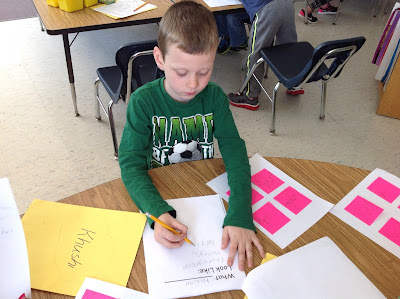Below are our classroom's published non-fiction Rainforest books. Just click on any book to learn about a rainforest animal which was researched, drafted and published by a student from Room 111. We all had fun learning about note taking, writing, editing and publishing. We even learned how to upload images into our books which cite the author and the license terms for each photo through www.photosforclass.com
So grab a cup of tea or your favorite beverage and take a moment right now to enjoy viewing just your child's book or all of the books from our classroom collection. Discover for yourself how hard-work mixed with fun pays off with a beautiful book!
After listening to a story or two, continue on in this blog to view classroom photos which capture the students collaborating, researching, editing, illustrating, publishing and sharing their books at our "Celebration." Enjoy!
Perkins' Rain Forest Book
Matthew's Rainforest Book
Erin's Rainforest Book
Anjani's Rainforest Book
Mile's Rainforest Book
Tessa's Rainforest Book
Jackson's Rainforest Book
Colin's Rainforest Book
Christi's Rainforest Book
Annabelle's Rainforest Book
Kushi's Rainforest Book
Tanuj's Rainforest Book
Olivia's Rainforest Book
Evan's Rainforest Book
Liam's Rainforest Book
Denzel's Rainforest Book
Emma's Rainforest Book
Ellie's Rainforest Book
How We Researched:
Step One:
After choosing which rainforest animal we wanted to research, we began with a R.A.N. chart. Prior to doing any research, we wrote information/facts which we thought to be true about our animal on post-it notes. We then placed them on the "What I Think I know" page of our R.A.N. chart:
Step Two: We began to research facts on our animal in a few different ways.:
We researched facts and jotted them down in our Research Notebook. We focused our research on "What the Animal Looks Like"; "Where It Lives"; "What It Eats" and "Other Amazing Facts." We got to choose from the following animals: jaguars, poison dart frogs, toucans, anacondas and sloths.
A. We researched through teacher-approved websites on our iPads:
B. We Researched Through "Sketch to Stretch":
In "Sketch to Stretch" the teacher reads us some information from a book and/or a magazine and we quickly sketch some pictures with labels to help us remember the facts about our animal.

Step Three: We begin to write the first draft of our informative piece, using the information from our Research Notebook:

C. We researched through books in our classroom library:
We then added this information into the proper page of our Research Notebook:
Step Four: We Edit and Publish our Informative Writing on our iPad:
After much writing and editing with the help of our teacher, we are ready to input all of our words into our electronic book created on the Bookcreator app on our iPad. We use www.photosforclass.com to find appropriate, kid-friendly photos to go with our writing. Each photo also cites from where the photograph came.
Step Five: We Celebrate!
After much research, drafting, typing and layout work, our book is ready to be recorded. We read aloud to record what we have written on each page and then share with our fellow classmates. Each of us gets the chance to listen to all of our classmates' books as we rotate around the room. After each listen, we jot down a short compliment on a piece of paper for our classmates to take home.
After much research, drafting, typing and layout work, our book is ready to be recorded. We read aloud to record what we have written on each page and then share with our fellow classmates. Each of us gets the chance to listen to all of our classmates' books as we rotate around the room. After each listen, we jot down a short compliment on a piece of paper for our classmates to take home.
Step Six: Back to Our R.A.N. Chart
Lastly, we go back to our R.A.N. chart. We move our post-it notes with information from the "What I think I know" page to the "Yes! I was right" page or the "I don't think this anymore" page.


















































































